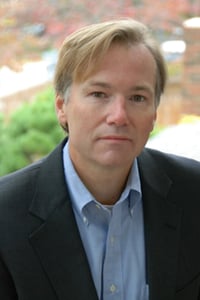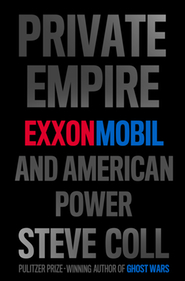 Measured by revenue, ExxonMobil is the largest corporation on earth. Its operations span the globe, and it behaves like a powerful sovereign, exercising immense influence over the governments of the United States and many other nations in which it has operations. Now two-time Pulitzer Prize–winner Steve Coll has written Private Empire: ExxonMobil and American Power, an in-depth study of the company under its past two CEOs, focusing on how it effectively pursues its own foreign policy and deflects demands for fiscal and environmental accountability. I put six questions to Coll about his book:
Measured by revenue, ExxonMobil is the largest corporation on earth. Its operations span the globe, and it behaves like a powerful sovereign, exercising immense influence over the governments of the United States and many other nations in which it has operations. Now two-time Pulitzer Prize–winner Steve Coll has written Private Empire: ExxonMobil and American Power, an in-depth study of the company under its past two CEOs, focusing on how it effectively pursues its own foreign policy and deflects demands for fiscal and environmental accountability. I put six questions to Coll about his book:
1. Ida Tarbell published The History of the Standard Oil Company in 1904. More than a century later, you have published a corporate biography of Standard Oil’s offspring, ExxonMobil. How do you relate your work to Tarbell’s?
Without wishing to suggest that my work is of equal value, I was stimulated, as she was, by the dilemmas of concentrated power that big oil companies present. Her investigation took place in an era of monopoly power emerging from rapid industrialization. I thought of my inquiry as located in an era of globalization, limits, and environmental stresses. ExxonMobil’s concentrated power within the United States remains an important problem—the corporation does much more to shape our energy economy than our democratically elected government—but the nature of its power worldwide has changed over a century. I was drawn for example to the scale of ExxonMobil’s influence in some of the poorest African countries where it drills for oil and gas, such as Chad and Equatorial Guinea.
2. ExxonMobil has a reputation for using threats of legal action in attempts to stifle unpleasant exposés—as The New Yorker discovered when it set out to publish Sy Hersh’s work on the Kazakh oil bribery scandal, in which Mobil played a central role. Did you experience any similar pushback from the company as you were researching and writing your book?
They never threatened me. They do walk softly and carry a big stick, however. They work indirectly and they strike at times and places of their own choosing, whether through litigation or other tactics. For example, when Greenpeace got under their skin, they quietly funded a nonprofit watchdog that questioned Greenpeace’s compliance with I.R.S. rules, which ended up generating a federal audit (which Greenpeace says it passed with flying colors). As I understood ExxonMobil’s litigation and information-management strategies, I tried to adapt as best I could. They tie up many of their employees with nondisclosure agreements that are in turn tied to retirement and pension benefits, so that was a difficult knot to unravel as I tried to develop informed sources. So far, so good, but if a van pulls up and its occupants take me away, I’m sure the van will be unmarked and its license plates untraceable.
3. A good deal of your reporting in this book examines ExxonMobil’s aggressive tactics in dealing with scientific studies that have produced conclusions unfriendly to the company. As a general matter, is ExxonMobil’s science honest?
The battle between ExxonMobil and [the National Oceanic and Atmospheric Administration] . . . illuminated a larger, recurring aspect of the corporation’s influence over American public life. Whether the subject was the damage caused by oil and gasoline spills, climate change, the safety of chemicals ExxonMobil manufactured, or other critical matters involving public health and the environment, the corporation joined directly in scientific controversies to protect its interests. It contracted with academic scientists, and it brought staff scientists out of ExxonMobil laboratories to lobby Congress and regulatory agencies. ExxonMobil’s science bore all the hallmarks of the corporation’s worldwide strategy: It was well funded, carried out by highly competent individuals, unrelenting in its focus on core business issues, and influenced by the litigation strategies of aggressive lawyers. Even the corporation’s most ardent opponents conceded that the individual ExxonMobil staff scientists they encountered were typically ethical and professional. The question that nagged those on the receiving end of ExxonMobil’s blended campaigns of research, lawsuits, and political lobbying was whether the corporation’s science could be judged honest.
—From Private Empire: ExxonMobil and American Power.
Reprinted by permission of The Penguin Press, © 2012 Steve Coll.
I’d say that their scientists are generally honest but their science management policies are not, in the sense that those policies are ultimately controlled by litigators and lobbying arms of the company, which use science not for the pursuit of truth, but as elements in directed arguments and campaigns tailored to advance corporate interests. I would imagine that there are a fair number of scientists within ExxonMobil who feel uncomfortable about the corporation’s uses of science in public policy and litigation, but who are not in a position to express dissent openly. I was able to tease out a little bit of this perception, but I feel confident that there is much more of it than I was able to document.
4. As you describe it, ExxonMobil has been deeply engaged with the global-warming debate. How has it gone about influencing the issue, and how would you assess its effectiveness?
When the Kyoto Accords were signed in 1997, many American industrial corporations opposed the agreement on fairness and economic grounds. ExxonMobil, however, led an additional and often undeclared attack on the science itself. It did so through ideological communications and advocacy groups led by non-scientists in many cases. This campaigning continued until 2006, when it began to back off some. In 2009, the corporation announced its support for a carbon tax, acknowledging for the first time that the risks of global warming justified a price on carbon-based fuels to incent diminished use. However, ExxonMobil has done little to advance this idea in practical ways, and I’m confident that its executives are satisfied that such a tax looks politically implausible at the moment. The legacy of the corporation’s campaign to challenge climate science remains significant. There is a wide gap between what the public believes global-warming science to hold and what qualified scientists believe it to hold. That gap was opened at least in part by ExxonMobil’s distinctive campaigning after Kyoto.
5. You suggest that under CEO Rex Tillerson, ExxonMobil has softened its opposition to government efforts to address global warming. But in a speech at the Council on Foreign Relations a few weeks ago, Tillerson downplayed the threat generated by global warming, saying “it’s an engineering problem, and it has engineering solutions.” Is Tillerson’s position really different from that of former CEO Lee Raymond?
[T]he environment in which ExxonMobil and the Bush administration devised parallel approaches to managing science and public policy in the age of oil spills and global warming was influenced by several factors that Darwin would not have recognized. One was the prominence of lawyers and their win-for-the-client mind-sets. The tobacco industry’s near bankruptcy had demonstrated that not even talented lawyers could overcome terrible facts in a product liability matter. Yet that example had also shown how industry funding and purposeful, subtle campaigning could profitably delay a legal reckoning for a dangerous product through the manipulation of public opinion, government policy, and scientific discourse.
—From Private Empire: ExxonMobil and American Power.
Reprinted by permission of The Penguin Press, © 2012 Steve Coll.
Raymond has a personal conviction that global-warming science is wrong. I don’t see evidence that Tillerson believes differently; he has just been less assertive and has pursued different corporate tactics. His comments about adaptation at the Council were surprising. I found them tone deaf in ways I don’t typically associate with Tillerson.
6. Over the past twenty years a large global movement has arisen demanding greater transparency surrounding payments made by natural-resources companies to the governments in the developing world, where rent-seeking and corruption have historically been rampant. ExxonMobil has been a leading voice opposing measures requiring the industry to publish what it pays to these governments. Considering countries like Equatorial Guinea, what do you expect we would learn from this payment information?

ExxonMobil has supported some versions of transparency, but it is lobbying now against the Dodd-Frank rules that would make required disclosures much more detailed. The hypothesis that transparent information about payments by resource companies to host governments will reduce rent-seeking and corruption depends on the presence of local civil-society groups and democratic opposition to press accountability on the government. Unfortunately those groups are not present in Equatorial Guinea because the government has suppressed them. In other African countries where ExxonMobil operates, such as Chad and Angola, there are some civil-society groups, but they are weak. So I think it may take much more than transparent information to change conditions in these places. By locating the struggle around that issue alone, I suspect the corporations recognize they have an advantage because (a) they have the power to lobby to tailor the rules and (b) they are not accountable for anything more than disclosure. My own view is that in a country like Chad—one of the very poorest on Earth—corporate responsibility by ExxonMobil has to encompass much more.



